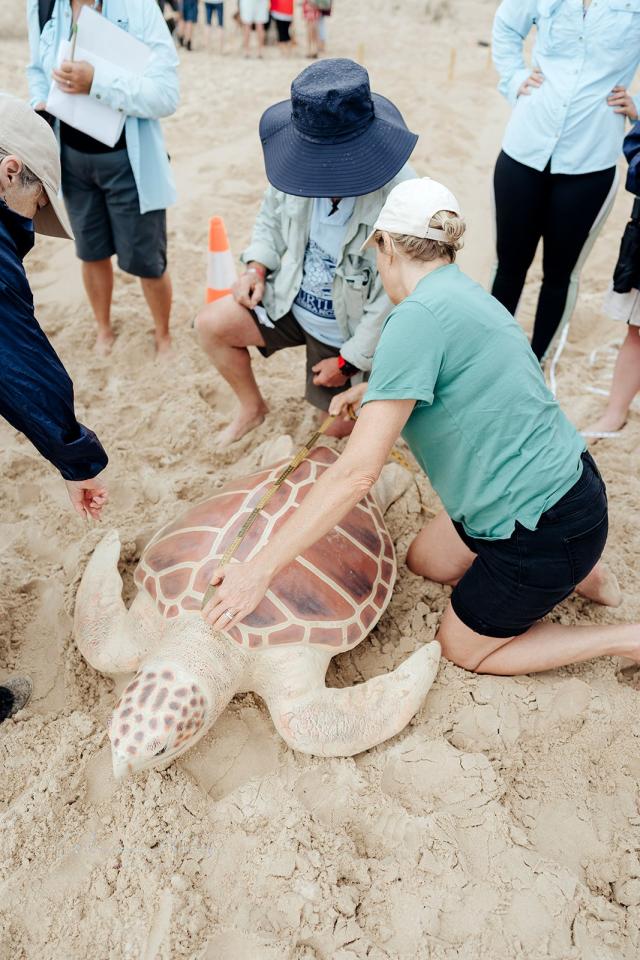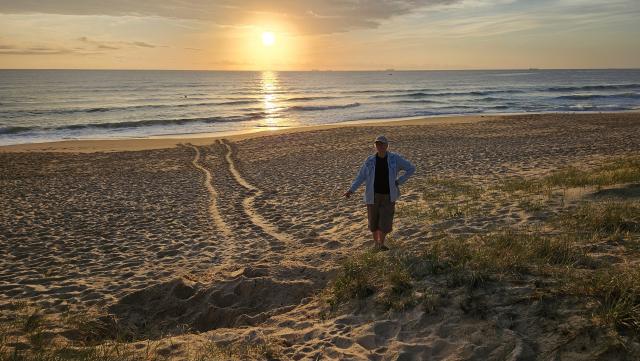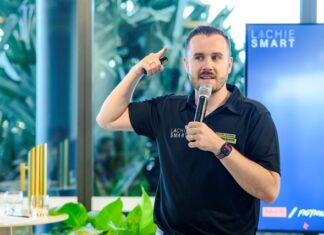It was a picture-perfect moment to mark the start of turtle season on the Sunshine Coast’s southern beaches, with the first nest found at Buddina nesting beach.
The moment was captured by Marjon and Judi, expert turtle citizen scientists and members of TurtleCare Buddina, on Monday 27 November, in a gorgeous sunrise shot which showed two sets of tracks on the beach.
One set was made as the turtle made her way up the beach to lay her nest and the other as she made her way back to the ocean.
TurtleCare, which is managed by Sunshine Coast Council, monitors beaches at the southern end of the coast.
Sunshine Coast Council’s TurtleCare Conservation Officer Kate Hofmeister said the volunteers were very excited the season had officially begun.
“More than 250 turtle volunteers across the Sunshine Coast are expecting to see turtle tracks during their early morning local beach patrols any day now,” Ms Hofmeister said.
“Last season was a totally unexpected bumper season with 91 critically endangered loggerhead turtle nests laid and one green turtle nest.
“While we don’t know what to expect this season, we are hoping to see the familiar shells of a few of our well-known turtles and we are excited to have a new group monitoring North Bribie Island, which has now joined up to Happy Valley.
“A gentle reminder that nesting turtles are easily disturbed, so we ask our community to please give the turtles lots of space if they come across one on the beach.
“Meanwhile, the first nest on a northern Sunshine Coast beach was found last week by Coolum and North Shore Coast Care members who monitor the area north of the Maroochy River.
“The volunteers from TurtleCare and Coolum and North Shore Coast Care updated their skills at annual training in mid-November so they can continue to perform the valuable citizen scientist role of protecting nests and collecting data on the endangered species.”
Mrs Hofmeister highlighted the importance of residents turning off any unnecessary external lighting at night.
“Sea turtles are not often found nesting in areas of high population density, so we are very lucky to have these ancient mariners still coming to our shores on the Sunshine Coast each summer, especially when you consider sea turtles have been nesting here for thousands of years,” Mrs Hofmeister said.
“This year’s hatchlings have a one in 1000 chance of surviving to adulthood, and if they do, they will return to start nesting on Sunshine Coast beaches in the year 2053.
“Adult and hatchling turtles are highly sensitive to artificial light. A dark beach is the best way to attract nesting turtles to local beaches and allow the hatchlings to make their own way to the ocean.
“We have seen, on a number of occasions, the negative and disorienting impacts lights can have on turtle nesting, so it is important we all work together to protect these majestic creatures.
“Turtle nesting season is a time when our residents can come together as a turtle-friendly community to celebrate and help protect these threatened species.
“We can all help by keeping plastic waste out of waterways and beaches and cutting the glow of lights after 8pm during nesting and hatchling season.”
To report turtle tracks, new nests and emerging hatchlings on the southern end of the coast, call Sunshine Coast Council’s Turtle Care hotline 0437 559 067 or for sightings from Mooloolaba north, call Coolum and North Shore Coast Care on 0478 435 377.
Pop the numbers in your mobile phone now so you can easily contact our wonderful volunteers.
Sunshine Coast Council’s marine turtle conservation program is guided by the Sunshine Coast Marine Turtle Conservation Plan.
Find out more about our marine turtle plan, the TurtleCare volunteer program and the tracking projects on council’s website by searching TurtleCare or Googling TurtleCare Sunshine Coast.










